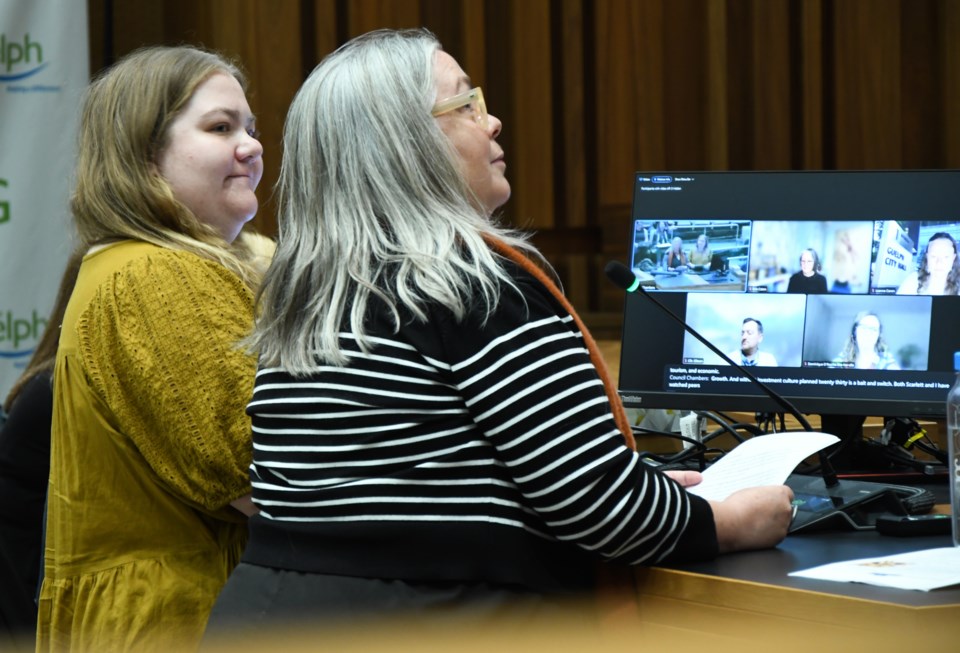Don’t put off environmental or cultural initiatives in the city, expand them.
That’s the message repeatedly delivered to city council on Tuesday evening during a special delegation night for the mayor’s 2025 city budget update.
“I am shocked by the line items that have been deprioritized in this next budget,” said Jamie Mendoza, who called for increased funding for the arts and community organizations. “I appreciate the need for this administration to balance the budget but I hope we can all agree that good decision-making in this realm must consider what the impact on the entire Guelph community will be.”
If finalized as it is, the budget update would come with a 3.21 per cent tax increase in 2025 for the city-controlled portion of the budget, which is up from 2.59 per cent in the draft document released last month.
When the boards and committees deliver their budgets in January, Mayor Cam Guthrie noted the property tax increase could be in the range of 5.5 per cent – if they don’t seek funding increases.
Restoring cuts to transit, climate change initiatives, arts and culture and active transportation infrastructure were the focus of most of the delegations. Speaker after speaker called on council to not only move forward with those initiatives, but expand them.
“This is not the time to stop, cut, defer or step back,” said Donna Jennison, referring to initiatives to fight climate change, which come with a $153,867 drop in funding compared to what was approved last year. “In fact, we need to do much more.
“We must commit to acting now individually and most importantly, collectively to accelerate action, cut our emissions and to project and regenerate life, sustainable ecosystems.”
Several speakers turned out in support of a community benefit agreement (CBA) for the Guelph Tool Library to provide waste reduction and diversion programs next year – things that have reduced in the city budget.
The updated budget calls for $62,000 in one-time funding for the tool library, though $80,000 in each of the next three years was previously planned.
Another frequent topic of interest was the subsidy provided to youth groups to use recreational facilities – a reduced from 47.5 per cent to 42.5 per cent and phased in over two years.
Several people spoke of the impact rising costs could have on participation levels and continued involvement.
Council was also encouraged to fully restore funding for the 200th anniversary of Guelph’s settlement in 2027. The bicentennial was to receive $905,000 in funding over three years with those funds completely pulled from the draft budget update. Last week, Guthrie announced funding of $103,000 would be reinstated.
“We are proud citizens, not just penny-pinching taxpayers,” said Susan Ratcliffe. “We don’t want a strong mayor who cares only about budget-cutting. We want a mayor who cares about celebrating our city’s past, present and future.”
Speaking in favour of the mayor’s budget, Ryan Meunier spoke of his desire to see property tax increases kept at about the rate of inflation, which would be roughly two per cent this time around.
“Survival trumps everything,” Meunier told council, explaining he views mental and social well-being, sports and arts as lower priorities. “You have to say no to things that are not necessary for survival or that compromise the basic needs of people that you have been elected to serve.
“I don’t feel that any level of government is respecting the people they’re elected to serve.”
Those basic needs, Meunier said, are shelter, water and clothing. “That’s all we need.”
Now that they’ve heard public feedback on the budget update and listened to requests for funding changes, councillors have an opportunity to propose and consider amendments during another special meeting on Nov. 27, beginning at 9 a.m.
The mayor then has 10 days to veto any amendments approved by council.
If no vetoes are issued, the budget is considered adopted.
Should the mayor veto one or more amendments, council has until Dec. 18 to override that decision with at least two-thirds support, meaning nine of 13 votes on council.



.png;w=120;h=80;mode=crop)
